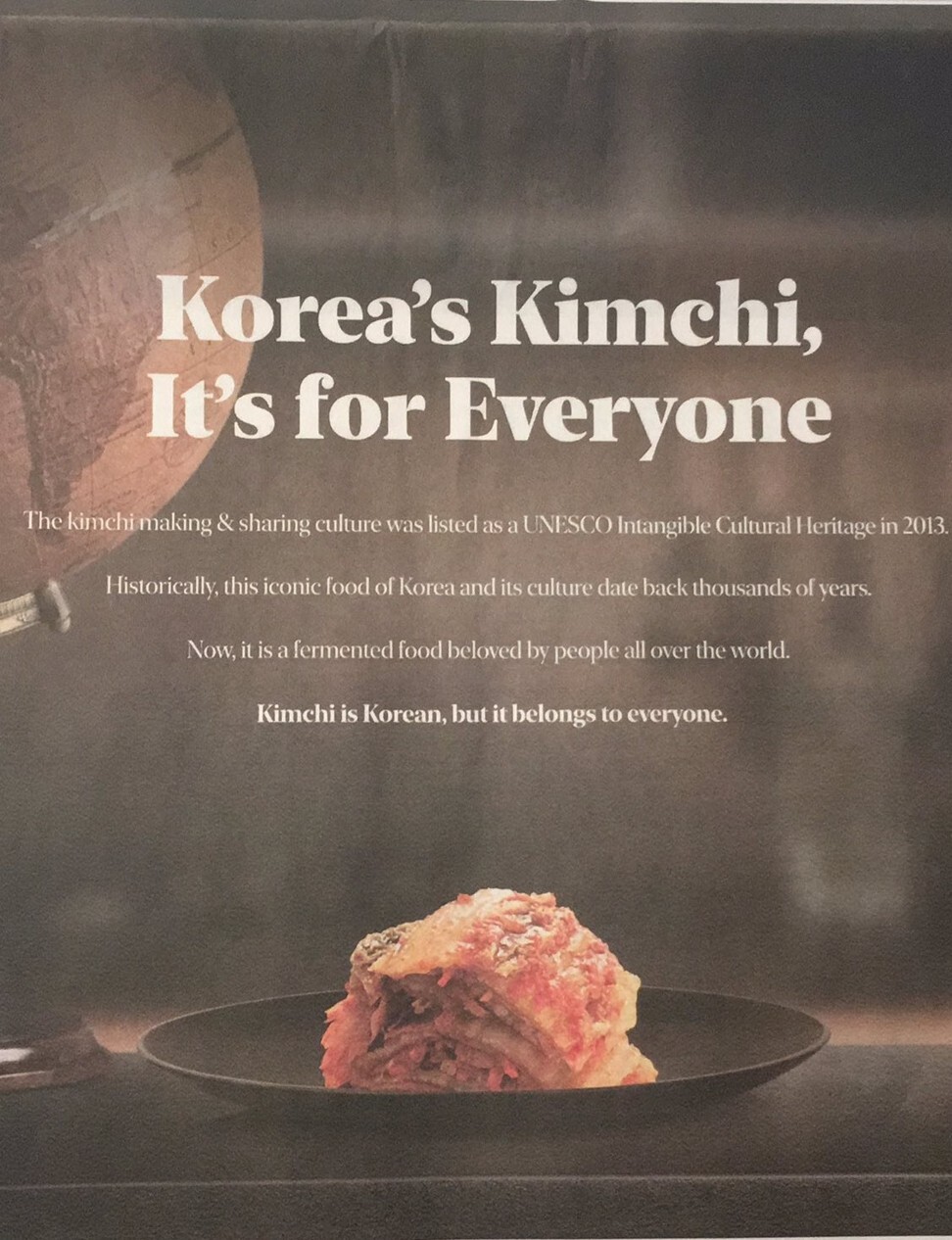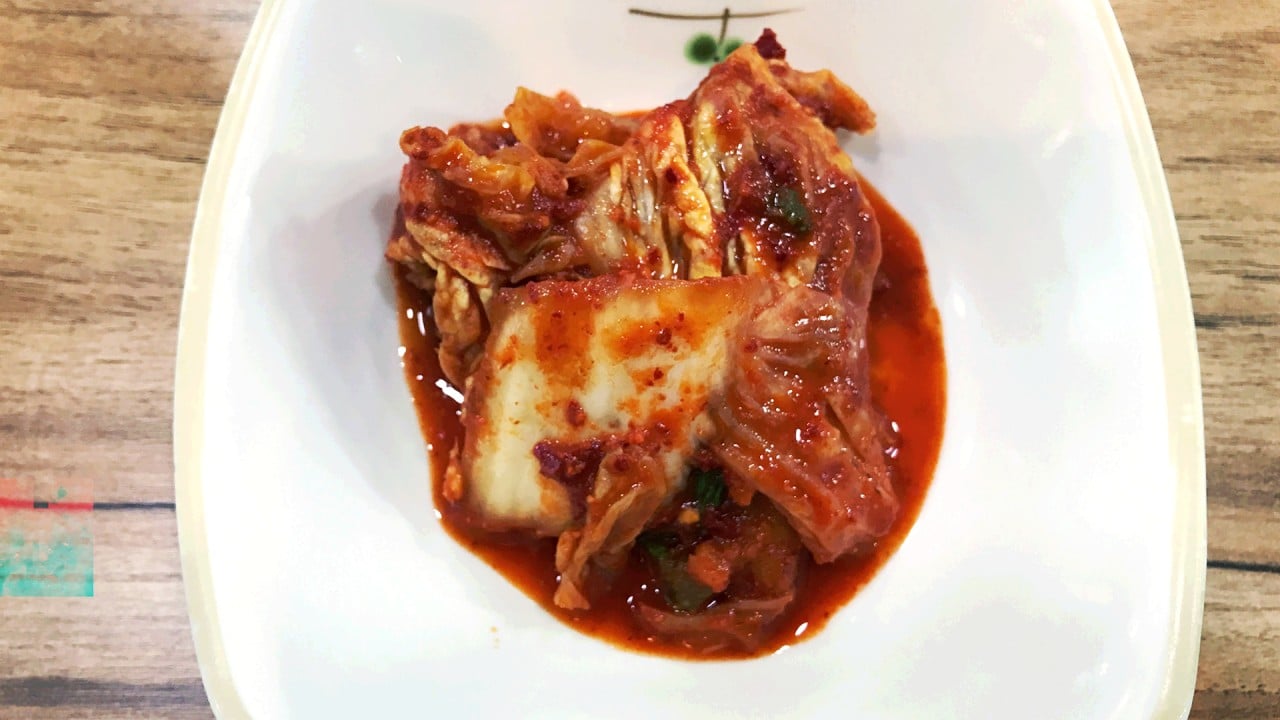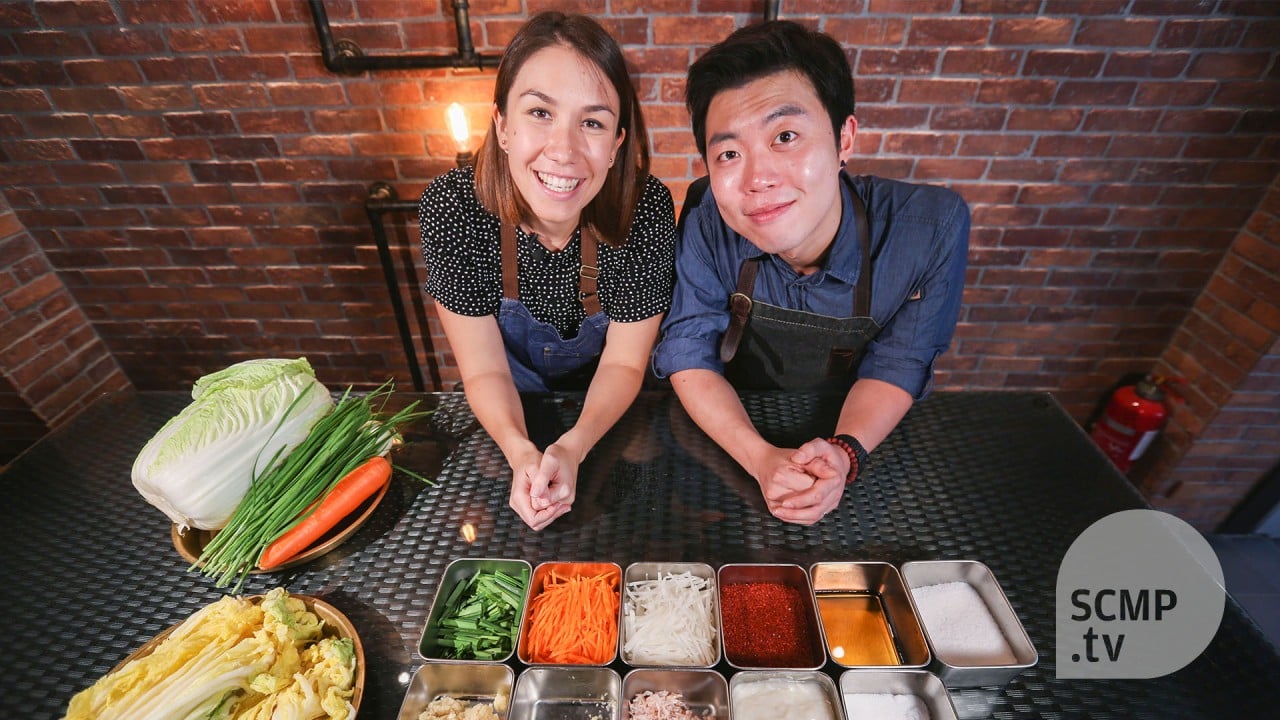
Kimchi wars: South Korean academic takes spat with China to new level with tart ad in New York Times
- Sungshin University professor says he ran advert to let ‘world know clearly that kimchi belongs to Koreans’
- The shot across the bow of China was the latest in a simmering dispute between the two countries over which one can rightfully claim the pungent delight
Seo Kyoung-duk, a professor at Sungshin University in Seoul who specialises in publicity, said he launched the campaign announcing Kimchi as an “iconic food of Korea and its culture”, as acknowledged by Unesco, “in order to let all the peoples in the world know clearly that kimchi belongs to Koreans, pure and simple”.
The advert ran in the Times’ US and international editions on Monday.

Seo said he felt compelled to place the ad in response to China taking credit for being the origin of the fermented vegetable dish, whose popularity is gaining worldwide.
“Chinese online influencers, state-controlled news media, government officials and even its ambassador to the UN are going all-out in their efforts to commandeer kimchi as something Chinese,” he told This Week in Asia.
Beijing recently won certification from the International Organization for Standardisation (ISO) for pao cai, a pickled vegetable dish from Sichuan province in southwestern China, an achievement Global Times, a tabloid affiliated with Communist Party mouthpiece People‘s Daily, reported as “an international standard for the kimchi industry led by China”.
That claim was refuted by the ISO, which clarified that the certification was for pao cai, not kimchi. Pao cai is a typical Chinese pickled vegetable dish, but differs from kimchi in its preparation method and ingredients used.
The spat intensified earlier this month when China’s ambassador to the United Nations, Zhang Jun, posted a picture on himself on Twitter holding a full tray of kimchi, urging his followers to “try some home-made kimchi by yourself”.
A kimchi-making video uploaded by Chinese internet culinary sensation Li Ziqi with the hashtag #ChineseFood also added fuel to the flare-up online, with critics saying the 19-minute video insulted Korean culture.
Meanwhile, China has pulled the plug on a South Korean social media influencer after she added a thumbs-up emoji to comments online criticising China for claiming to be the origin of kimchi and ssam, a pork-and-vegetables wrap.
The influencer, nicknamed Hamzy, was kicked off Chinese microblogging site Weibo and video-sharing website Bilibili, with all her postings erased by Tuesday, Yonhap news agency said.
The Shanghai-based company Suxian Advertising, which runs Hamzy‘s video accounts and her online shop on the e-commerce site Taobao, also said it planned to terminate its contract with her, shut down her online shop and delete her videos.
Kimchi wars: new China vs South Korea row sparked by Li Ziqi video
Hamzy had 2.9 followers on Weibo and 1.3 million followers on Bilibili.
Chinese internet users said she had insulted China by showing her approval for what was in effect anti-China commentary.
“If I have to say kimchi belongs to China in order to operate in China, I would stop operating there,” Hamzy said via her YouTube account.
Na Kyung-won, a well-known politician from South Korea’s conservative opposition People‘s Power Party who is running for Seoul mayor, jumped to Hamzy’s defence, accusing China of being “small-minded”.

02:05
Kimchi, the latest cultural feud between South Korea and China
“I support Hamzy for speaking her mind,” Na said on Facebook.
“This is a sort of cultural retaliation that does not fit the era of globalisation,” she said. “If China hits us with cultural and economic retaliations, we should not sit idle.”
Seo‘s advert, which he said was produced by “kimchi experts”, carried a picture of a dish of chilly-flavoured, pungent kimchi with the text: “The Kimchi making & sharing culture was listed as a Unesco Intangible Cultural Heritage in 2013. Historically, this iconic food of Korea and its culture date back thousands of years.”
Adding that the fermented food has grown to be loved by people around the world, it ends with, “Kimchi is Korean, but it belongs to everyone.”
Kimchi wars: Korean live-streamer faces Chinese web users’ wrath
Instead of trying to counter every claim made by China over kimchi, Seo said he decided to let the world know the “accurate facts” about the dish in a “concise and visually striking way” rather than simply being “swept up in anger” over the issue.
Seo is also planning to release a series of YouTube videos on the “facts of kimchi” in different languages, including Chinese and English, with the first episode expected to run in March.
Seo said kimchi is not the only Korean cultural item China claims as its own, noting that Korea‘s flowing traditional robe, the Hanbok, and its ancient solo opera form Pansori are also said by many Chinese people to have their origins in the mainland.
He attributed the seeming cultural appropriation to nationalist envy. “Chinese people may feel threatened by the rise of K-pop, including boy band group BTS, K-drama and K-films such as the Oscar-winner Parasite, as Asian culture was almost synonymous with Chinese culture in the past,” Seo said.
“I strongly suspect that Chinese party and government authorities condone all these distorted expressions of patriotism by young Chinese people, which would undermine friendly ties between the two countries,” he added.

01:55
Learn how to make kimchi from a Korean chef
Lee Seong-hyon, head of the centre for Chinese Studies at Sejong Institute, a non-profit think tank, noted that Chinese and Koreans have clashed many times in the past over contentious issues including where the borders of the ancient Koguryo Kingdom in Manchuria should be drawn and whether the Chinese philosopher Confucius was of Korean blood.
If China ends up alienating many Koreans over kimchi, it would satisfy Chinese people‘s nationalistic ego for a moment
Chinese authorities may find it beneficial to let the kimchi spat intensify in order to “fan patriotism and rally support” for the government and Chinese Communist Party as it marks its centenary this year, he said.
But to Koreans, Lee said, “the issue is something of a different order because Kimchi is part of the Korean identity; Koreans eat Kimchi at every meal and it‘s like oxygen” for them.
“If China ends up alienating many Koreans over kimchi, it would satisfy Chinese people‘s nationalistic ego for a moment but it would not be helpful for China’s ling-term national interests,” he added.

